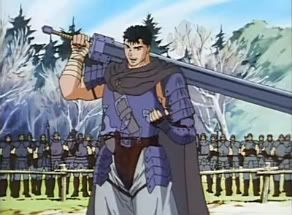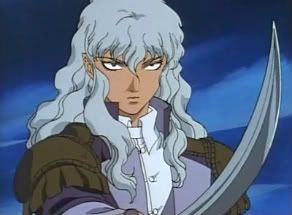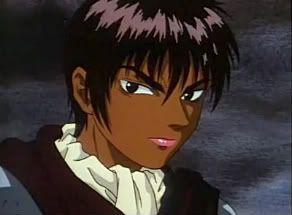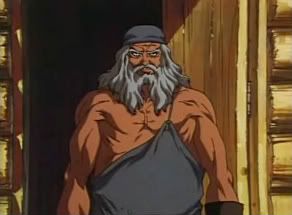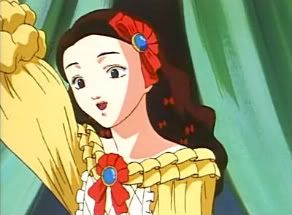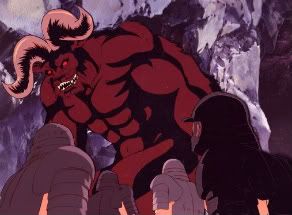|
Berserk |
|
Synopsis Analysis The various fights and machinations which occur through the course of the series are usually well handled and are both exciting and affecting. The battles are particularly enjoyable, although their emotivity is, admittedly, somewhat weakened by the consistency with which the protagonists win them. While the director could have imbued them with greater tension by having his heroes be defeated from time to time, he has, despite this weakness, infused them a sufficient sense of violent exhilaration that the viewer is engulfed in the series' savage, bloody world. His excitement is made even greater as a result of his engagement with the characters and his involvement in the program's complex narrative. The protagonists of Berserk are, fortunately, generally well crafted individuals. Guts is not the simple, brutal oaf of many similar fantasy stories but is a person with a very troubled past filled with both emotional and physical abuse. His personal limitations and difficulties are deftly linked with his upbringing and are effectively presented. Casca too is depicted as a person emotionally limited by past mistreatment. She is absolutely loyal to Griffith, and the viewer can understand why she feels as she does, so that as she begins to develop romantic feelings for Guts, he understands both the difficulty she has in accepting such emotions and her consequent hesitation. Griffith, however, is, perhaps, the series' greatest success. He is charismatic, brave, sensitive, and intelligent, but he is also coldly ruthless and overwhelmingly ambitious. The viewer is made to sympathize with him but is hardly surprised when he performs a variety of absolutely reprehensible acts. He is not a simple character, but a complex and well realized individual. Sadly, the program's villains are far less interesting. Most are simple cackling fiends, and the rest are either cowardly, conniving worms or pompous buffoons. A number of the recurring villains do consequently grow tiresome as the series continues. Fortunately, their presence is rarely more than a momentary distraction. Such persons are usually included in the narrative only to provide obstacles for the protagonists to overcome, and it is the latter who are consistently the focus of the program. The series' worst fault, however, is its structure. When Berserk concludes, it leaves the viewer feeling as though he has seen only the introduction to a larger narrative rather than a complete story. The first episode is set some time after those that follow it, and these subsequent episodes relate the events that led to the situation with which the viewer is presented in the first episode. The few events shown in that initial episode clearly occur within a larger narrative, but, unfortunately, that story is never told. While the viewer sees the causes of the conflicts hinted at in that episode, he is left feeling somewhat dissatisfied since these conflicts are never revealed to him in full. Despite this, the story which sets the stage for the events of the first episode is enjoyable in its own right and is certainly worth watching. Finally, I should mention that the quality of the animation used in Berserk is generally high. The makers of the series have employed a dark, harsh style more reminiscent of American animation than anything else currently being made in Japan. While the character designs do suffer from this departure from the generally appealing conventions being developed in anime, the art, as a whole, is interesting and attractive. The director presents the viewer with a rough, gloomy world and effectively uses the animation to make manifest the violence and cruelty his character both suffer and inflict. While not invariably successful, Berserk is an exciting, engaging series. It is well worth watching. Review by Keith Allen
Home Page / Alphabetical List of
Films © 2005 movierapture@hotmail.com Keith Allen. All rights reserved. |



